Who among us is not delighted to receive boxes of assorted chocolates, each one a complete surprise1, even novelty? Anthologies are the narrative equivalent. Whereas one might tire of reading story after story by the same person2, anthologies ensure that one is opening a chocolate box of stories by many authors. The only common thread: the editor’s taste.
Long-running anthology series offer the above and more. Finish one volume… there’s more chocolate boxes to sample. In addition, a long-running series comes with the promise of additional delights: haunting used bookstores in quest of missing volumes. There just no way to lose with long-running anthologies series3.
Here are five series that you might consider adding to your to-be-read pile (otherwise known as Mount Tsundoku).
The Year’s Best S-F edited by Judith Merril (1956–1968)
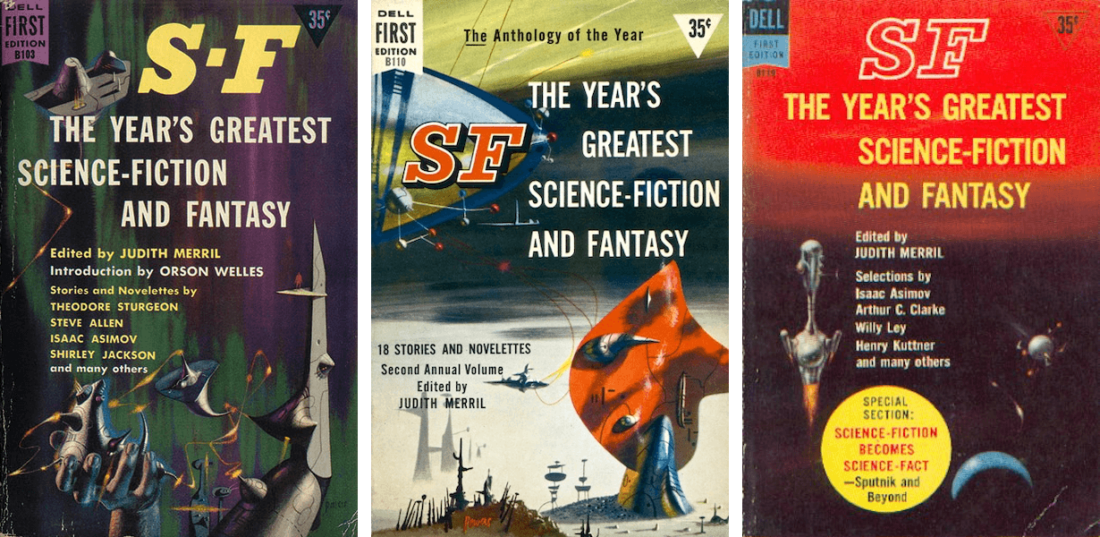
Judith Merril’s The Year’s Best S-F was notable for a number of reasons. One was that (as far as I know) her series was the only Best SF annual series helmed by a solitary woman in the 20th century (at least in English). Another was Merril’s diligence in searching out good stories in venues that other editors overlooked4, as well as highlighting stories by authors not known for writing SF. One could never be quite sure what one might find in a Merril Best S-F volume.
Appearing under various titles as S-F: The Year’s Greatest Science-Fiction and Fantasy, The Year’s Best S-F, 9th Annual S-F, and The Best of Sci-Fi, Best S-F lasted twelve volumes… unless one counts Merril’s Best of the Best, which depending on how you view the overlapping anthologies from Delacorte and Mayflower, added between one and three more volumes to the list5.
Nebula Award Stories (1966 onward)
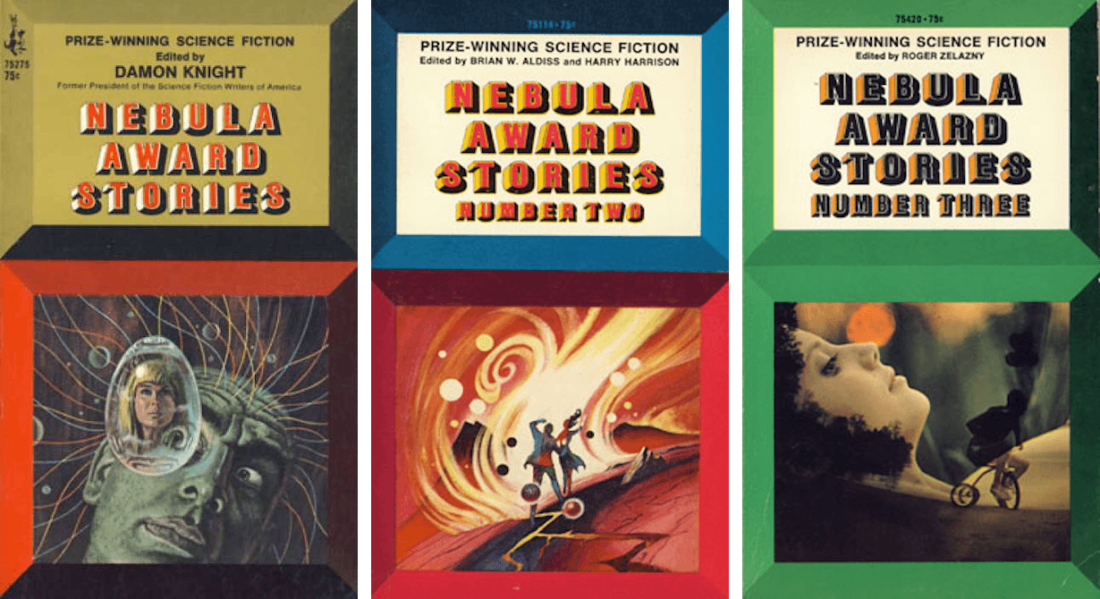
The Nebula Awards honor noteworthy speculative fiction, as voted upon by the members of the Science Fiction and Fantasy Writers of America. Following a 1965 proposal by Lloyd Biggle, anthologies showcasing Nebula winners and (some) runners-up have been published almost every year, helmed by a rotating roster of editors.
The series can be read as a documentary of speculative fiction’s evolution over the last seven decades. This is reflected in the charming diversity of titles under which the stories were published: Nebula Award Stories, Nebula Winners, The Nebula Awards, Nebula Awards, Nebula Awards Showcase, and perhaps others I have missed. Despite what appear to be Covid-instigated stumbling blocks in the path of recent volumes, the series has racked up an impressive fifty-five volumes to date.
The Year’s Best Science Fiction (1984–2018)
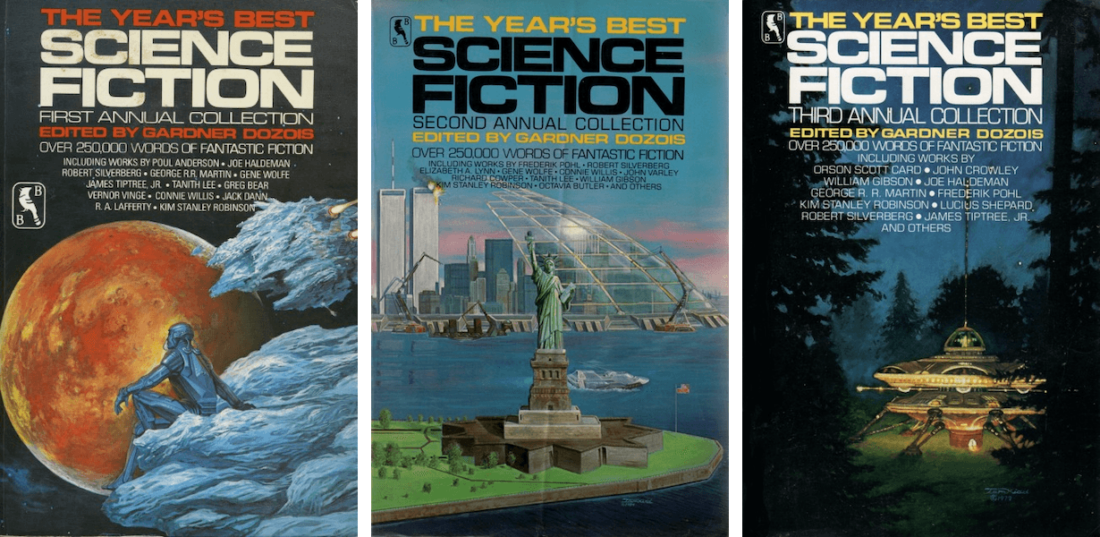
Gardner Dozois’ The Year’s Best Science Fiction could be easily spotted amongst the legions of Best SF annuals. Dozois’ anthologies (which he inexplicably called “collections”) were massive tomes, ranging from just short of six hundred to seven hundred-plus pages long. Astonishingly, Dozois’ The Year’s Best Science Fiction was a one-man show: Dozois read voluminously and broadly, without the legions of helpers one might assume he enlisted.
Not only is each volume hefty enough to present a challenge for those readers on whose shoulders time weighs heavily, Dozois edited a prodigious number of volumes: thirty-five, plus three additional volumes offering the Best of the Best. The series would be worth seeking out simply for its annual summary of events in the field. Good thing most (or all?) of the volumes appear to be in print, at least in ebook.
Tesseracts (1985 onward)
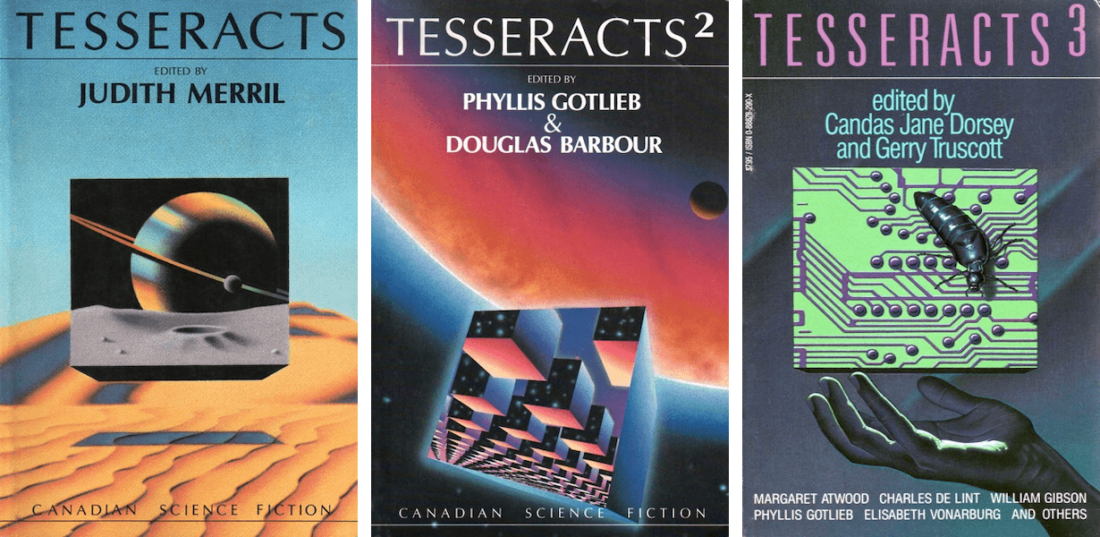
Tesseracts curates noteworthy Canadian science fiction6. First helmed by Judith Merril—Merril appears over and over in the history of 20th century SF—each volume is edited by a different editor or pair of editors7. As well, the volumes vary in theme, sharing only the requirement of being as Canadian as possible under the circumstances.
To date, Tesseracts comprises an impressive twenty-two numbered volumes, plus Tesseracts Q (featuring 20 years of SF stories from Quebec-based authors, and available in an English translation). There does not seem to have been a new volume since 2019 (blame Covid?). Unusually for a series whose initial volumes appeared so long ago, the entire series appears to be available for purchase from publisher Edge.
The Year’s Best Fantasy and Horror (1987–2008)
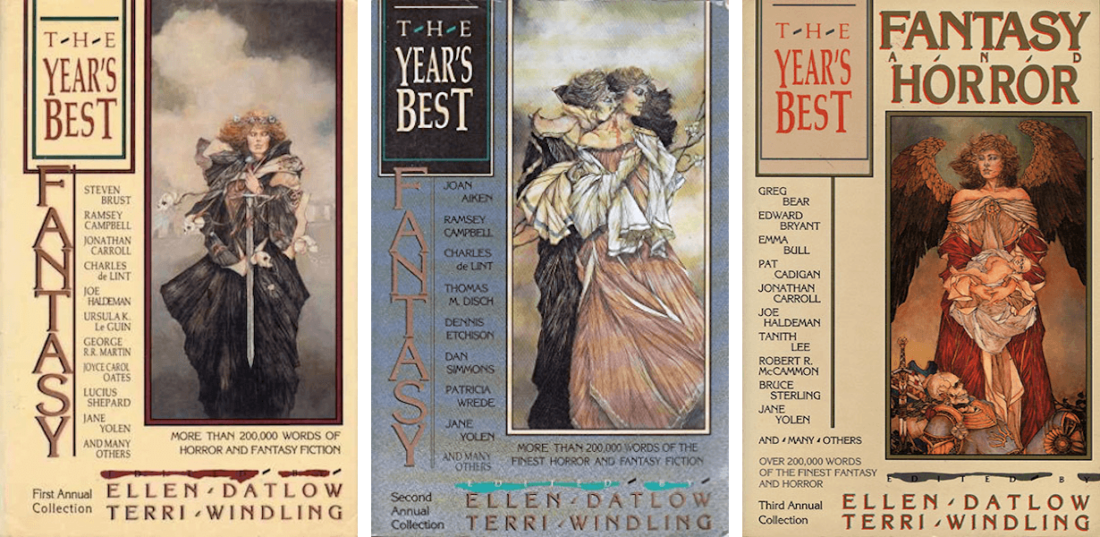
Initially titled The Year’s Best Fantasy, horror was added to the title in the third year. For many years, Ellen Datlow and Terri Windling8 shared editorial burdens, Datlow covering horror and Windling fantasy. In later volumes Gavin J. Grant and Kelly Link take over for Windling.
As with the Dozois series, this multiple-World Fantasy Award-winner offers shelf-threatening reading enjoyment. Each of the twenty-one volumes is a tome. While the series didn’t quite enjoy the longevity of Dozois’ series, Datlow, Windling, Grant, and Link offered something Dozois did not: eye-catching Thomas Canty cover art.
Have I overlooked your favourite long-running anthology series? One certain to delight and intimidate readers with duration, quantity, and vast shelf-space requirements? Feel free to mention it in comments below.
- There’s no surprise if one reads the convenient guide that so many boxes of chocolates have on their inner lid, but where is the fun in that? ↩︎
- Unless one could somehow set one collection aside to resume later, a development I am assured is only as far off as inexpensive commercial fusion. I assume it involves blockchain somehow. ↩︎
- Well… it would be a losing proposition to read Best Speculative Fiction Printed With a Lethal Contact Poison. Good that no publisher has yet taken up this challenge. ↩︎
- Also of interest, the extremely inclusive definition of “year” that Merril embraced: it was a rare volume that didn’t span two calendar years, and at least one volume spanned decades. ↩︎
- One to three entirely redundant volumes for anyone who read the first twelve, as all the stories were drawn from volumes one to twelve. ↩︎
- Tesseracts is not a year’s best Canadian SF. That would be Stephen Kotowych’s Year’s Best Canadian Fantasy and Science Fiction, now in its second year. ↩︎
- Including at least three from Waterloo County, which is as unexpected to me as was the number of Mennonite or Mennonite-adjacent authors amongst nominees and inductees for the Canadian Science Fiction and Fantasy Association’s Hall of Fame. ↩︎
- In general, one cannot go wrong with Windling anthologies. Unfortunately, readers are aware of that. Accordingly, Windling anthologies are rare enough on used bookstore shelves that when I asked a proprietor if he had any, he laughed at my temerity. ↩︎










